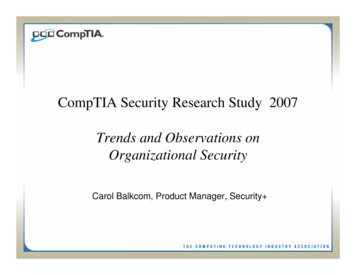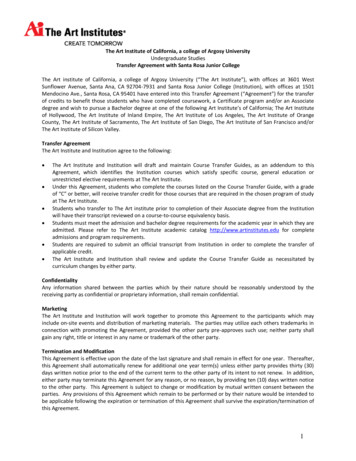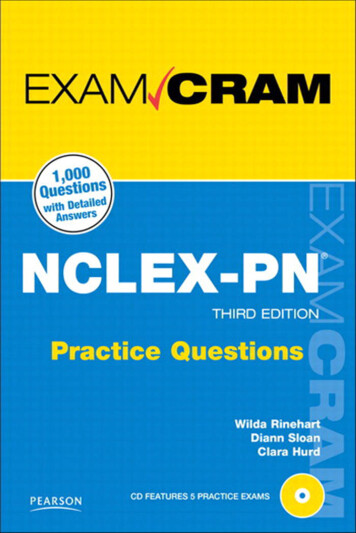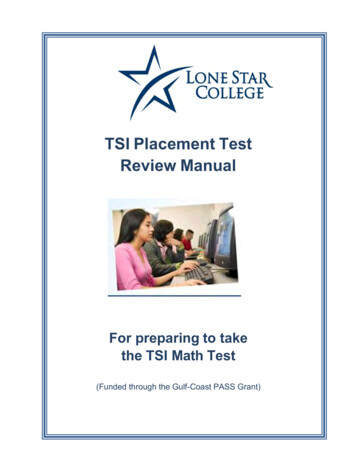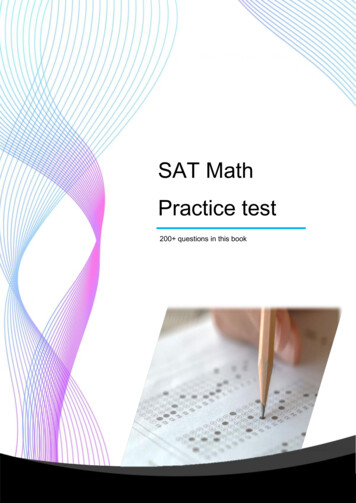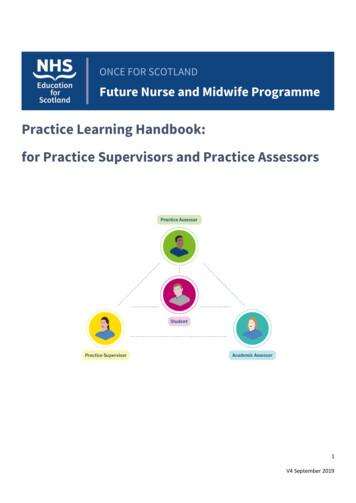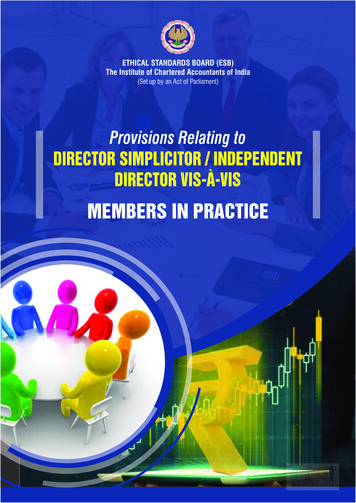
Transcription
ETHICAL STANDARDS BOARD (ESB)The Institute of Chartered Accountants of India(Set up by an Act of Parliament)Provisions Relating toDIRECTOR SIMPLICITOR / INDEPENDENTDIRECTOR VIS-À-VISMEMBERS IN PRACTICE
Provisions relatingto Director Simplicitor/Independent Directorvis-à-visMembers in PracticeEthical Standards BoardThe Institute of Chartered Accountants of India(Set up by an Act of Parliament)
Provisions relating to director simplicitor/ independentDirector vis-à-vis Members in practiceEthical Standards BoardThe Institute of CharteredAccountants of India(Set up by an Act of Parliament)President’s Message“When you are able to maintain your own highest standards of integrity regardless of what others may do - you are destined for greatness.” – Napoleon HillThe maintenance of the highest standards and professional ethics is of utmost importance. Thefundamental principles signify the profession’s recognition of its responsibility of public interestfor Chartered Accountants. The Institute of Chartered Accountants of India is making its norms invarious spheres relating to the profession of chartered accountancy and updating the same fromtime to time.The Independent Director, being a non executive director engages in improving corporate credibilityand governance standards of the Company. Chartered Accountants due to their expertise andknowledge are preferred choice of a company for nomination as Independent Director. They areexpected to act as a guide to the company and ensure that the company moves in the right directionutilising their expertise. Therefore, it is necessary for chartered accountants being a independentdirector, to be aware of their responsibilities and the ethical requirements vis-à-vis The CharteredAccountants Act, 1949, Code of Ethics etc.The Ethical Standards Board considering the importance of this decided to bring booklet on“Provisions relating to Director Simplicitor/ Independent Director vis-à-vis Members in Practice”.At this juncture, I compliment the efforts of CA. Kemisha Soni, Chairperson, CA. N. C. Hegde, ViceChairman and other members of the Ethical Standards Board, for bringing out this booklet.I sincerely believe that this booklet will be of immense use to the members.Vice-President’s MessageCA. Atul Kumar GuptaPresidentThe Institute of Chartered Accountants of India (ICAI) has since long been adhering to the values ofexcellence, independence, integrity and infuses in its members the utmost sense of responsibility andcommitment towards the professional ethics. The Institute through the Ethical Standards Board developsand issues ethical standards and other pronouncements for the members. It works towards evolving adynamic and contemporary Code of Ethics and ethical behaviour for members as also to protect the dignityand interests of the members.I am happy to announce that in its endeavour of meaningful knowledge dissemination and acquaintingmembers with the contemporary ethical requirements, the Ethical Standards Board is bringing out thebooklet on “Provisions relating to Director Simplicitor/ Independent Director vis-à-vis Members inPractice”. This booklet shall serve as compendium and would provide useful insights pertaining to therelevant scope of work as per the provisions of the Companies Act and code of ethics which is utmostessential while discharging their duties as Independent Director or Director Simplicitor in a company.I express my appreciation for CA. Kemisha Soni, Chairperson, CA. N C Hegde Vice-Chairman and otheresteemed members of the Board. I sincerely believe that the members of the profession shall find thebooklet immensely useful and relevance.CA. Nihar N. JambusariaVice-President, ICAI3
Ethical Standards BoardThe Institute of CharteredAccountants of India(Set up by an Act of Parliament)Provisions relating to director simplicitor/ independentDirector vis-à-vis Members in practiceChairperson’s MessageThe Ethical Standards Board is continuously working towards achieving its objective to set upcontemporary ethical standards for chartered accountants and strengthening the public confidencein the profession.Keeping in view of the responsibilities of the members in practice being a independent directoror Director Simplicitor in Companies, and their compliances with the professional ethics, theEthical Standards Board has come up with this booklet. This booklet contains relevant provisionsof Companies Act, 2013, the Chartered Accountants Act, 1949, Code of Ethics, frequently askedquestions and the decisions of the Ethical Standards Board taken from time to time on the said issue.I would also like to place on record my deep appreciation to the officers of Secretariat of EthicalStandards Board in this regard. I hope that this publication will be of immense use to the members,and other interested readers.Vice-Chairman’s MessageCA. Kemisha SoniChairperson, Ethical Standards BoardI am extremely happy to share that Ethical Standards Board is coming up with the booklet on“Provisions relating to Director Simplicitor/ Independent Director vis-à-vis Members in Practice”.This booklet is a compilation of provisions relating to member in practice being Director Simplicitor/Independent Director , and FAQs relating to such members. I extend my words of appreciationsto Chairperson, and other esteemed members of the Board. I would also like to place on record mydeep appreciation for the Secretariat of Ethical Standards Board for his efforts and contribution inbringing out this booklet.I hope that this booklet help to members in discharging their responsibility.CA. Nandkishore Chidamber HegdeVice-ChairmanEthical Standards Board4
Provisions relating to director simplicitor/ independentDirector vis-à-vis Members in practiceEthical Standards BoardThe Institute of CharteredAccountants of India(Set up by an Act of Parliament)AcknowledgementThe Ethical Standards Board acknowledges the valuable contribution made by CA. Prafulla PremsukhChhajed, Past President, CA. Shriniwas Yeshwant Joshi, CA. Durgesh Kabra, CA. Rajendra Kumar Pand CA. G. Sekar for bringing out this publication. We wish to place on record sincere thanks to all themembers for their suggestions, support and guidance in finalizing this booklet5
Provisions relating to director simplicitor/ independentDirector vis-à-vis Members in practiceEthical Standards BoardThe Institute of CharteredAccountants of India(Set up by an Act of Parliament)Composition of Ethical Standards Board 2020-2021Members CA. Kemisha Soni, Chairperson CA. Nandkishore Chidamber Hegde, Vice-Chairman CA. Atul Kumar Gupta, President (Ex-officio) CA. Nihar Niranjan Jambusaria, Vice-President (Ex-officio) CA. Jay Chhaira CA. Prafulla Premsukh Chhajed, Past President CA. Tarun Jamnadas Ghia CA. Aniket Sunil Talati CA. Babu Abraham Kallivayalil CA. G Sekar CA. M P Vijay Kumar CA. Ranjeet Kumar Agarwal CA. Shriniwas Yeshwant Joshi CA. Hans Raj Chugh CA. Pramod Jain CA. (Dr.) Sanjeev Kumar Singhal CA. Charanjot Singh Nanda CA. Dheeraj Kumar Khandelwal Adv. Vijay Kumar Jhalani Ms. Mahua Pal Shri Sunil KanoriaCo-opted Members CA. Sanjiv Kumar Chaudhary CA. Minesh Jain CA. Pankaj Tyagi CA. B.S. Yadav CA. Shrikumar Banerjee CA. Sunil Talati, Past President CA. Rajiv SaldiSpecial Invitee CA. Maitreyee Roy CA. Sunil Bajaj7
Provisions relating to director simplicitor/ independentDirector vis-à-vis Members in practiceEthical Standards BoardThe Institute of CharteredAccountants of India(Set up by an Act of Parliament)Table of ContentsMessagesI. Provisions applicable for Independent DirectorA. Provisions applicable for Independent Director under Companies Act, 2013Section 149. Company to have Board of DirectorsSection 150. Manner of selection of independent directors and maintenanceof databank of independent directors.—B. Provisions applicable for Independent Director under The Companies(Appointment and Qualification of Directors) Rules, 2014.11111314Rule 3 Woman Director on the Board.14Rule- 5 Qualifications of Independent Director15Rule-4 Number of Independent DirectorsRule 6. Compliances required by a person eligible and willing to be appointedas an independent director.1416C. Code for Independent Directors (Schedule IV of Companies Act, 2013)17D. Provisions applicable for Director Simplicitor mentioned under Volume-IIof Code of Ethics, 2020:-21Clause (11) of the part I of the first schedule of the Chartered Accountants Act, 1949 andcommentary appearing in Volume II of revised Code of Ethics, 2020Commentary to clause (4) of the part I of the second schedule of the CharteredAccountants Act, 1949 appearing in Volume II of revised code of ethics, 2020E. Provisions applicable for Director mentioned under Volume-I of Code of Ethics,2019 based on the 2018 edition of Code of Ethics issued by InternationalEthics Standards Board for Accountants (IESBA):-212223Section 522- Recent Service with an Audit Client23Service During Period Covered by the Audit Report23Requirements and Application MaterialService Prior to Period Covered by the Audit ReportSection 523 Serving as a Director or Officer of an Audit ClientRequirements and Application MaterialService as Director or OfficerII. FAQs on Director Simplicitor / Independent Director2323242424249
Provisions relating to director simplicitor/ independentDirector vis-à-vis Members in practiceEthical Standards BoardThe Institute of CharteredAccountants of India(Set up by an Act of Parliament)I. Provisions applicable forIndependent DirectorA.Provisions applicable for Independent Director under Companies Act,2013Section 149. Company to have Board of Directors(1)(2)(3)(4)(5)(6)Every company shall have a Board of Directors consisting of individuals as directorsand shall have—(a) a minimum number of three directors in the case of a public company, twodirectors in the case of a private company, and one director in the case of a OnePerson Company; and(b) a maximum of fifteen directors:Provided that a company may appoint more than fifteen directors after passing aspecial resolution:Provided further that such class or classes of Companies as may be prescribed,shall have at least one woman director.Every company existing on or before the date of commencement of this Act shall withinone year from such commencement comply with the requirements of the provisions ofsub-section (1).Every company shall have at least one director who has stayed in India for a totalperiod of not less than one hundred and eighty-two days in the previous calendar year.Every listed public company shall have at least one-third of the total number of directorsas independent directors and the Central Government may prescribe the minimumnumber of independent directors in case of any class or classes of public Companies.Explanation.—For the purposes of this sub-section, any fraction contained in suchone-third number shall be rounded off as one.Every company existing on or before the date of commencement of this Act shall,within one year from such commencement or from the date of notification of the rulesin this regard as may be applicable, comply with the requirements of the provisions ofsub-section (4).An independent director in relation to a company, means a director other than amanaging director or a whole-time director or a nominee director,—(a) who, in the opinion of the Board, is a person of integrity and possesses relevantexpertise and experience;(b) (i) who is or was not a promoter of the company or its holding, subsidiary orassociate company;11
Ethical Standards BoardThe Institute of CharteredAccountants of India(Set up by an Act of Parliament)Provisions relating to director simplicitor/ independentDirector vis-à-vis Members in practice(ii) who is not related to promoters or directors in the company, its holding,subsidiary or associate company;(c) who has or had no pecuniary relationship with the company, its holding, subsidiaryor associate company, or their promoters, or directors, during the two immediatelypreceding financial years or during the current financial year;(d) none of whose relatives has or had pecuniary relationship or transaction withthe company, its holding, subsidiary or associate company, or their promoters, ordirectors, amounting to two per cent. or more of its gross turnover or total incomeor fifty lakh rupees or such higher amount as may be prescribed, whichever islower, during the two immediately preceding financial years or during the currentfinancial year;(e) who, neither himself nor any of his relatives—(i) holds or has held the position of a key managerial personnel or is or has beenemployee of the company or its holding, subsidiary or associate company inany of the three financial years immediately preceding the financial year inwhich he is proposed to be appointed;(ii) is or has been an employee or proprietor or a partner, in any of the threefinancial years immediately preceding the financial year in which he isproposed to be appointed, of—(A) a firm of auditors or company secretaries in practice or cost auditors ofthe company or its holding, subsidiary or associate company; or(B) any legal or a consulting firm that has or had any transaction with thecompany, its holding, subsidiary or associate company amounting to tenper cent. or more of the gross turnover of such firm;(iii) holds together with his relatives two per cent. or more of the total votingpower of the company; or(iv) is a Chief Executive or director, by whatever name called, of any non profitorganisation that receives twenty-five per cent. or more of its receipts fromthe company, any of its promoters, directors or its holding, subsidiary orassociate company or that holds two per cent. or more of the total votingpower of the company; or(7)12(f) who possesses such other qualifications as may be prescribed.Every independent director shall at the first meeting of the Board in which heparticipates as a director and thereafter at the first meeting of the Board in everyfinancial year or whenever there is any change in the circumstances which may affecthis status as an independent director, give a declaration that he meets the criteria ofindependence as provided in sub-section (6).Explanation.—For the purposes of this section, ―nominee director‖ means a directornominated by any financial institution in pursuance of the provisions of any law forthe time being in force, or of any agreement, or appointed by any Government, or anyother person to represent its interests.
Provisions relating to director simplicitor/ independentDirector vis-à-vis Members in practice(8)(9)Ethical Standards BoardThe Institute of CharteredAccountants of India(Set up by an Act of Parliament)The company and independent directors shall abide by the provisions specified inSchedule IV.Notwithstanding anything contained in any other provision of this Act, but subject tothe provisions of sections 197 and 198, an independent director shall not be entitledto any stock option and may receive remuneration by way of fee provided under subsection (5) of section 197, reimbursement of expenses for participation in the Boardand other meetings and profit related commission as may be approved by the members.(10) Subject to the provisions of section 152, an independent director shall hold office fora term up to five consecutive years on the Board of a company, but shall be eligible forreappointment on passing of a special resolution by the company and disclosure ofsuch appointment in the Board’s report.(11) Notwithstanding anything contained in sub-section (10), no independent director shallhold office for more than two consecutive terms, but such independent director shallbe eligible for appointment after the expiration of three years of ceasing to become anindependent director:Provided that an independent director shall not, during the said period of three years,be appointed in or be associated with the company in any other capacity, either directlyor indirectly.Explanation.—For the purposes of sub-sections (10) and (11), any tenure of anindependent director on the date of commencement of this Act shall not be counted asa term under those sub-sections.(12) Notwithstanding anything contained in this Act,—(i) an independent director;(ii) a non-executive director not being promoter or key managerial personnel, shall beheld liable, only in respect of such acts of omission or commission by a companywhich had occurred with his knowledge, attributable through Board processes,and with his consent or connivance or where he had not acted diligently.(13) The provisions of sub-sections (6) and (7) of section 152 in respect of retirement ofdirectors by rotation shall not be applicable to appointment of independent directors.Section 150. Manner of selection of independent directors and maintenance ofdatabank of independent directors.—(1)Subject to the provisions contained in sub-section (6) of section 149, an independentdirector may be selected from a data bank containing names, addresses andqualifications of persons who are eligible and willing to act as independent directors,maintained by any body, institute or association, as may by notified by the CentralGovernment, having expertise in creation and maintenance of such data bank and puton their website for the use by the company making the appointment of such directors:Provided that responsibility of exercising due diligence before selecting a person fromthe data bank referred to above, as an independent director shall lie with the companymaking such appointment.13
Ethical Standards BoardThe Institute of CharteredAccountants of India(Set up by an Act of Parliament)(2)(3)(4)B.Provisions relating to director simplicitor/ independentDirector vis-à-vis Members in practiceThe appointment of independent director shall be approved by the company ingeneral meeting as provided in sub-section (2) of section 152 and the explanatorystatement annexed to the notice of the general meeting called to consider the saidappointment shall indicate the justification for choosing the appointee for appointmentas independent director.The data bank referred to in sub-section (1), shall create and maintain data of personswilling to act as independent director in accordance with such rules as may beprescribed.The Central Government may prescribe the manner and procedure of selection ofindependent directors who fulfil the qualifications and requirements specified undersection 149.Provisions applicable for Independent Director under The Companies(Appointment and Qualification of Directors) Rules, 2014.Rule 3 Woman Director on the Board.The following class of Companies shall appoint at least one woman director(i)(ii)every listed company;every other public company having -(a) paid–up share capital of one hundred crore rupees or more; or(b) turnover of three hundred crore rupees or more:Provided that a company, which has been incorporated under the Act and is coveredunder provisions of second proviso to sub-section (1) of section 149 shall complywith such provisions within a period of six months from the date of its incorporation:Provided further that any intermittent vacancy of a woman director shall be filled-upby the Board at the earliest but not later than immediate next Board meeting or threemonths from the date of such vacancy whichever is later.Explanation.- For the purposes of this rule, it is hereby clarified that the paid up sharecapital or turnover, as the case may be, as on the last date of latest audited financialstatements shall be taken into account.Rule-4 Number of Independent Directors(1) The following class or classes of Companies shall have at least two directors asindependent directors -(i) the Public Companies having paid up share capital of ten crore rupees or more; or(ii) the Public Companies having turnover of one hundred crore rupees or more; or(iii) the Public Companies which have, in aggregate, outstanding loans, debenturesand deposits, exceeding fifty crore rupees:14
Provisions relating to director simplicitor/ independentDirector vis-à-vis Members in practiceEthical Standards BoardThe Institute of CharteredAccountants of India(Set up by an Act of Parliament)Provided that in case a company covered under this rule is required to appoint ahigher number of independent directors due to composition of its audit committee,such higher number of independent directors shall be applicable to it:Provided further that any intermittent vacancy of an independent director shall befilled-up by the Board at the earliest but not later than immediate next Board meetingor three months from the date of such vacancy, whichever is later:Provided also that where a company ceases to fulfil any of three conditions laid downin sub-rule (1) for three consecutive years, it shall not be required to comply withthese provisions until such time as it meets any of such conditions;Explanation. - For the purposes of this rule, it is here by clarified that, the paid up sharecapital or turnover or outstanding loans, debentures and deposits, as the case may be,as existing on the last date of latest audited financial statements shall be taken intoaccount:(2)Provided that a company belonging to any class of Companies for which a highernumber of independent directors has been specified in the law for the time being inforce shall comply with the requirements specified in such law.The following classes of unlisted public company shall not be covered under sub-rule(1), namely:-.(a) a joint venture;(b) a wholly owned subsidiary; and(c) a dormant company as defined under section 455 of the Act.”Rule- 5 Qualifications of Independent Director(1)An independent director shall possess appropriate skills, experience and knowledgein one or more fields of finance, law, management, sales, marketing, administration,research, corporate governance, technical operations or other disciplines related tothe company’s business.(2) None of the relatives of an independent director, for the purposes of sub-clauses (ii)and (iii) of clause (d) of sub-section (6) of section 149,-(i) is indebted to the company, its holding, subsidiary or associate company or theirpromoters, or directors; or(ii) has given a guarantee or provided any security in connection with the indebtednessof any third person to the company, its holding, subsidiary or associate companyor their promoters, or directors of such holding company, for an amount of fiftylakhs rupees, at any time during the two immediately preceding financial years orduring the current financial year.15
Ethical Standards BoardThe Institute of CharteredAccountants of India(Set up by an Act of Parliament)Provisions relating to director simplicitor/ independentDirector vis-à-vis Members in practiceRule 6. Compliances required by a person eligible and willing to be appointed as anindependent director.(1)Every individual –(a) who has been appointed as an independent director in a company, on the date ofcommencement of the Companies (Appointment and Qualification of Directors)Fifth Amendment Rules, 2019, shall within a period of 7[thirteen months] fromsuch commencement; or(b) who intends to get appointed as an independent director in a company after suchcommencement, shall before such appointment, apply online to the institute forinclusion of his name in the data bank for a period of one year or five years or forhis life-time, and from time to time take steps as specified in sub-rule (2), till hecontinues to hold the office of an independent director in any company:(2)(3)(4)Provided that any individual, including an individual not having DIN, may voluntarilyapply to the institute for inclusion of his name in the data bank.Every individual whose name has been so included in the data bank shall file anapplication for renewal for a further period of one year or five years or for his lifetime, within a period of thirty days from the date of expiry of the period upto whichthe name of the individual was applied for inclusion in the data bank, failing which, thename of such individual shall stand removed from the data bank of the institute:Provided that no application for renewal shall be filed by an individual who has paidlife-time fees for inclusion of his name in the data bank.Every independent director shall submit a declaration of compliance of sub-rule (1)and sub-rule (2) to the Board, each time he submits the declaration required undersub-section (7) of section 149 of the Act.Every individual whose name is so included in the data bank under sub-rule (1) shallpass an online proficiency self-assessment test conducted by the institute withina period of one year from the date of inclusion of his name in the data bank, failingwhich, his name shall stand removed from the databank of the institute:[Provided that an individual shall not be required to pass the online proficiency selfassessment test, when he has served as a director or key managerial personnel, for atotal period of not less than ten years, as on the date of inclusion of his name in thedatabank, in one or more of the following, namely:3(a) listed public company; or(b) unlisted public company having a paid-up share capital of rupees ten crore ormore; or(c) body corporate listed on a recognized stock exchange:16Provided further that for the purpose of calculation of the period of ten years referredto in the first proviso, any period during which an individual was acting as a directoror as a key managerial personnel in two or more Companies or bodies corporate at thesame time shall be counted only once.
Provisions relating to director simplicitor/ independentDirector vis-à-vis Members in practiceEthical Standards BoardThe Institute of CharteredAccountants of India(Set up by an Act of Parliament)Explanation: For the purposes of this rule,(a)(b)(c)C.the expression “institute” means the ‘Indian Institute of Corporate Affairs at Manesar’notified under sub-section (1) of section 150 of the Companies Act, 2013 as the institutefor the creation and maintenance of data bank of Independent Directors;an individual who has obtained a score of not less than sixty percent. in aggregate inthe online proficiency self-assessment test shall be deemed to have passed such test;there shall be no limit on the number of attempts an individual may take for passingthe online proficiency self-assessment test.* “Act” means the Companies Act, 2013Code for Independent Directors (Schedule IV of Companies Act, 2013)The Code is a guide to professional conduct for independent directors. Adherence to thesestandards by independent directors and fulfilment of their responsibilities in a professionaland faithful manner will promote confidence of the investment community, particularlyminority shareholders, regulators and companies in the institution of independent directors.I. Guidelines of professional conduct:An independent director shall:(1) uphold ethical standards of integrity and probity;(2) act objectively and constructively while exercising his duties;(3) exercise his responsibilities in a bona fide manner in the interest of the company;(4) devote sufficient time and attention to his professional obligations for informedand balanced decision making;(5) not allow any extraneous considerations that will vitiate his exercise of objectiveindependent judgment in the paramount interest of the company as a whole,while concurring in or dissenting from the collective judgment of the Board in itsdecision making;(6) not abuse his position to the detriment of the company or its shareholders or forthe purpose of gaining direct or indirect personal advantage or advantage for anyassociated person;(7) refrain from any action that would lead to loss of his independence;(8) where circumstances arise which make an independent director lose hisindependence, the independent director must immediately inform the Boardaccordingly;(9) assist the company in implementing the best corporate governance practices.17
Ethical Standards BoardThe Institute of CharteredAccountants of India(Set up by an Act of Parliament)Provisions relating to director simplicitor/ independentDirector vis-à-vis Members in practiceII. Role and functions:The independent directors shall:(1) help in bringing an independent judgment to bear on the Board’s deliberationsespecially on issues of strategy, performance, risk management, resources, keyappointments and standards of conduct;(2) bring an objective view in the evaluation of the performance of board andmanagement;(3) scrutinise the performance of management in meeting agreed goals and objectivesand monitor the reporting of performance;(4) satisfy themselves on the integrity of financial information and that financialcontrols and the systems of risk management are robust and defensible;(5) safeguard the interests of all stakeholders, particularly the minority shareholders;(6) balance the conflicting interest of the stakeholders;(7) determine appropriate levels of remuneration of executive directors, keymanagerial personnel and senior management and have a prime role in appointingand where necessary recommend removal of executive directors, key managerialpersonnel and senior management;III.(8) moderate and arbitrate in the interest of the company as a whole, in situations ofconflict between management and shareholder’s interest.Duties :The independent directors shall—(1) undertake appropriate induction and regularly update and refresh their skills,knowledge and familiarity with the company;(2) seek appropriate clarification or amplification of information and, wherenecessary, take and follow appropriate professional advice and opinion of outsideexperts at the expense of the company;(3) strive to attend all meetings of the Board of Directors and of the Board committeesof which he is a member;(4) participate constructively and actively in the committees of the Board in whichthey are chairpersons or members;(5) strive to attend the ge
(Set up by an Act of Parliament) 9 Provisions relating to director simplicitor/ independent Director vis-à-vis Members in practice table of contents messages i. Provisions aPPlicable for inDePenDent Director a. Provisions applicable for independent Director under companies act, 2013 11 Section 149. Company to have Board of Directors 11 Section .
